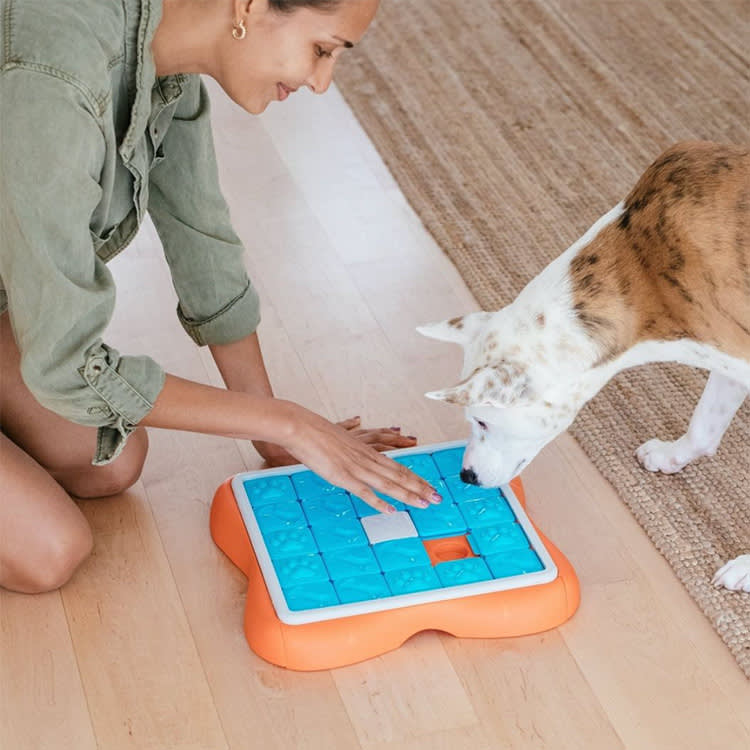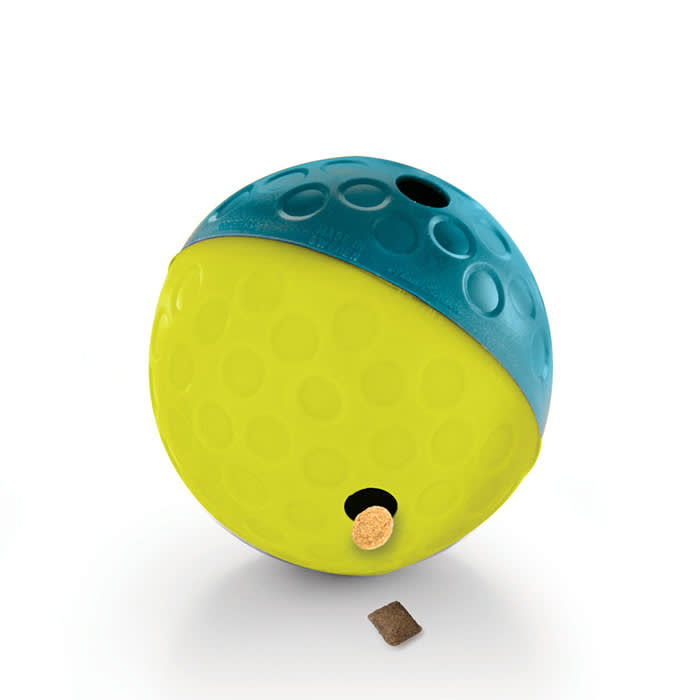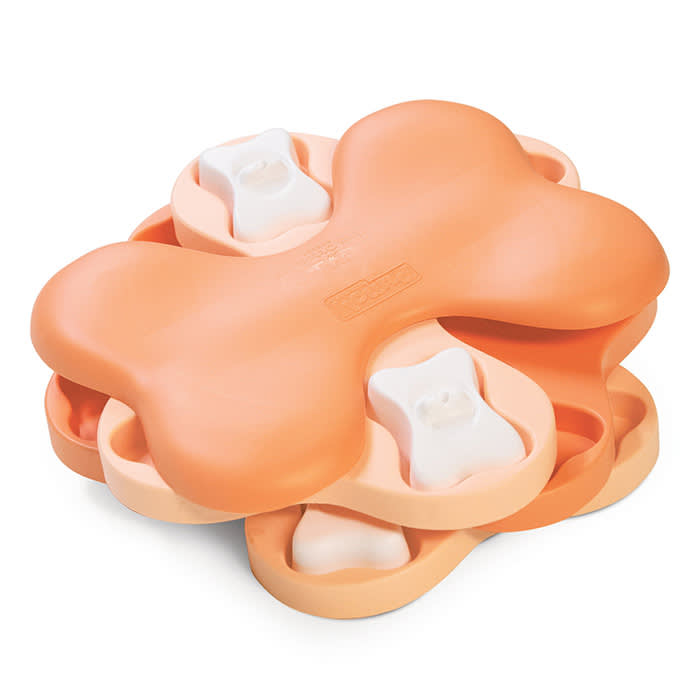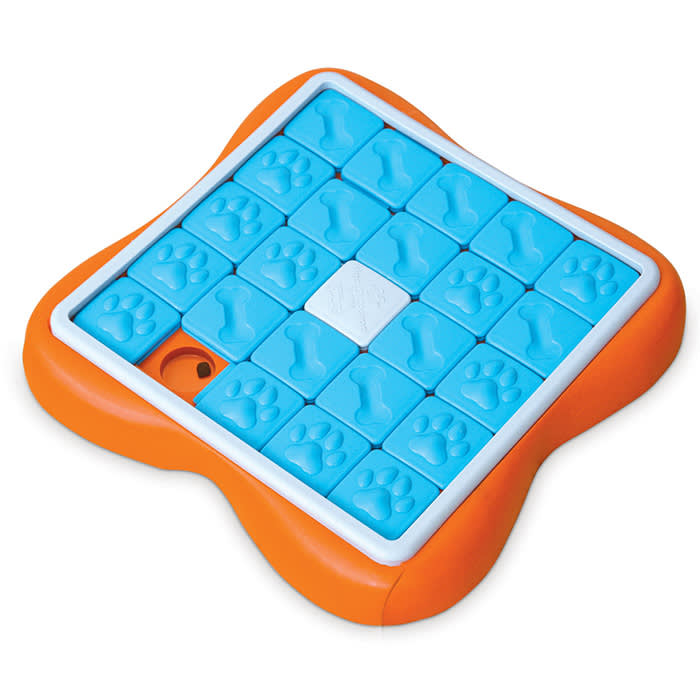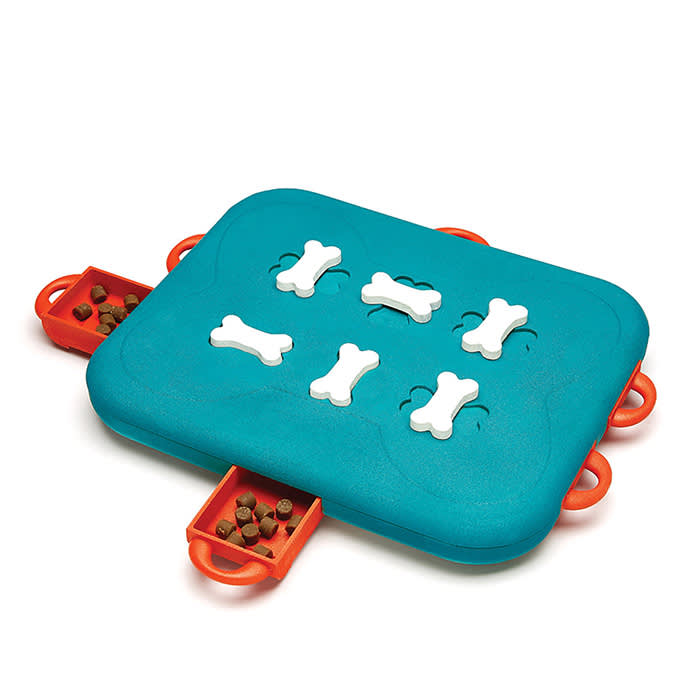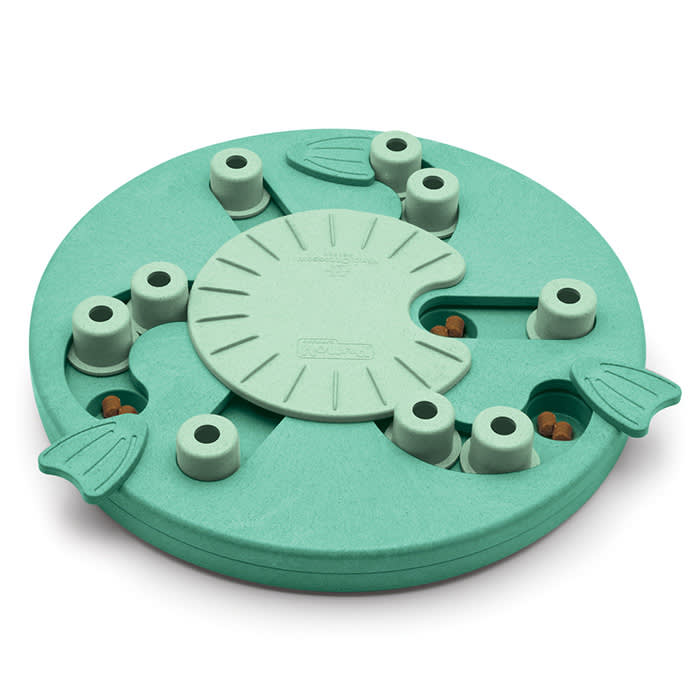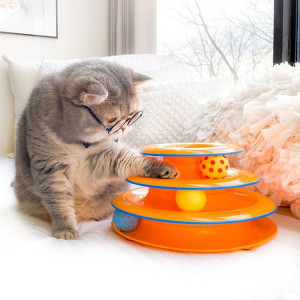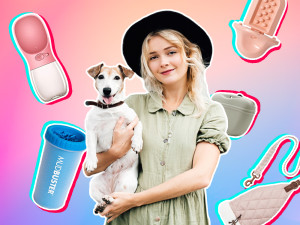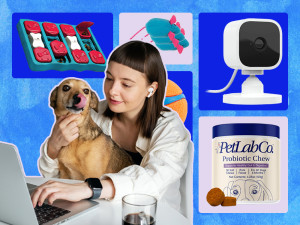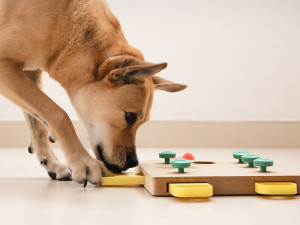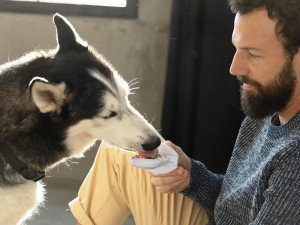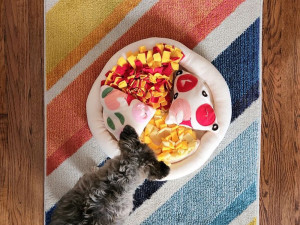6 Genius Interactive Dog Toys From Nina Ottosson
These puzzle toys are made to help you bond with your pup.
According to many dog psychologists and trainers, Nina Ottosson is one of the best in the business when it comes to designing and developing interactive toys for dogs. These mentally stimulating puzzle toys are meant to promote activity in dogs, despite their humans’ busy schedules. Ottosson knows firsthand how necessary her puzzles are. “I have always had dogs, cats, and other animals. I used to train and compete with my Bouvier des Flandres dogs,” Ottosson tells Kinship. “But when my two kids were born a year-and-a-half apart, I did not have time to activate my dogs the way they and I were used to. My bad conscience made me start thinking about how to activate my dogs in a simple, fun, and varied way indoors, together with my kids.”
Ultimately, the brand’s objective is a simple one. “My goal is for dogs and their owners around the world to have fun with my products,” Ottosson shares. All of Ottosson’s toys were designed to for pets and their people. “I call them ‘games’ because the owner and the pet are supposed to play together, which strengthens the bond between them,” she adds. So, whether you’re trying to ease tension when introducing a new pet into the family, teaching children how to engage with animals, or teaching your pup new tricks, you’ll be working toward your goal while connecting with your pet.
Materials were also a consideration. All Nina Ottosson products are non-toxic, BPA, PVC and phthalate free, and have been FDA-tested. “I only use the best materials, since my dogs, as well as your dogs, will use the products,” Ottosson says. Below, a breakdown on why animals need stimulation, how to connect with your pet through training and playtime, and which level of toy to start them on.
Your philosophy is that “dogs and cats have four legs and one head, and all five need exercise in different ways daily, both physically and mentally.” Why is that mental piece so important?
Wild animals get natural mental stimulation when hunting for food, which inspired me when developing the games to match the dog’s natural movements and instincts. All dogs (and other pets) need to use their brain in order to keep them mentally healthy. Some dogs need more mental stimulation than others.
How much do you spend on your pet per year?
If dogs are not provided with an outlet for their energy in the form of different types of activity or other stimulation, they become bored and can sometimes find their own “activity,” which we, as dog-owners, often do not appreciate, like chewing, barking, or just general hyperactivity.
Why is it important for dogs to test their problem-solving skills?
Puzzle games are not a test for problem-solving skills; it is more like a “tool” for the dog to use its natural instincts, just as we give our children toys to play with, like Legos. It’s not the final result we strive for. It is the time they try and play their way to a result that is important, not to evaluate their abilities.
Dogs need to explore in their own way. Treat-puzzle games are a fun and easy way to stimulate the dog’s senses, like their mind and nose, by using their natural instincts. A dog needs an outlet for their energy daily; some dogs require more than others, but all dogs need it in different ways.
The way I see it, the journey is more important than the destination. It’s about the experience itself for the dog, not just to reach the goal of solving the puzzle, but enjoying the activity as well as the reward. You have to keep trying. Like when you are hunting in nature, you don’t always catch something.
What kind of treats do you recommend adding to interactive puzzle toys for dogs?
When you start out, use something really tasty to give the dog an incentive to work for it. Dogs who are food-motivated will be happy to work for their food.
How do you suggest pet parents get started introducing puzzle toys to their dog?
I recommend starting to use the games with puppies, which is what I have done with my dogs. It’s important to start with games that are simple. Play for a very short time, play together, be positive, and give lots of praise. Start at an appropriate level for your dog. If your dog has never done anything like this, “level one” might be best. But if you have a smart dog who has done similar things before and is food motivated, you might be able to start at a higher level.
Just be careful that it’s not so difficult that the dog gets frustrated. Fill all the compartments with treats when the dog is watching, and leave some of the treats visible for an easy win. In the beginning, you have to show your dog the playing rules and how it works, and maybe even help them “cheat” a little. Always supervise, so the dog doesn’t try to chew his way to the treats.
Puzzles for dogs are like crosswords and Sudoku for us. We need to understand the rules of the game, how to solve it, or get help, especially if we try a more difficult version. If we don’t understand, we get frustrated and give up. Instead, dogs may start to chew and come up with their own solutions to find the treats, which is natural. So, we need to teach the dog how to play, so they understand how to play to find the treats, and step-by-step move up to more advanced puzzles.
How would you recommend integrating training into puzzle time?
The puzzles are a great way to teach your dog different commands like wait, sit, stay, etc. It’s fun; they get treats and you do something fun together.
How would you suggest making puzzles more difficult for pups who are becoming more advanced?
You can vary them in different ways. In some puzzles, you can add blocks to make them more difficult. You can also make a frozen puzzle by mixing some meaty dog food with water, or add natural yogurt and some tasty treats and freeze the puzzle, to make play time last longer. Another way is to put the game up on a stool, to make the dog only work with his mouth and nose, and not with his paws. A great tip is to make a puzzle race with several puzzles in a row, and hide a few treats in each puzzle. You can also hide puzzles in different rooms/places, behind doors, under a blanket, etc, and let the dog search for the puzzles.
Did you design any of your toys with puppies, senior dogs, flat-faced dogs, chewers, or easily bored dogs in mind? What puzzles would you recommend for small, medium, and large sized dogs?
All my puzzle games can be used by dogs of all sizes, ages, and breeds. But some are better suited for puppies, without small or loose parts. Some puzzles have large or shallow treat compartments, which are best suited for flat-nosed dogs. Some are made in a plastic/wood composite material, which is heavier and sturdier and suitable for rough dogs. For dogs that are easily bored, I recommend an easier game that gives immediate rewards. They can also be adapted to different sizes, for example by tying strings in removable parts, to make it easier to lift for small dogs.
Best Interactive Toys for Dogs by Level
Choosing which level to start your dog on is kind of like figuring out what reading level your kid is at. We want them to be challenged, but not to the point of frustration. Here’s what to know about keeping your dog engaged without overcommitting them to a too-tough toy.
Btw, our editors (and their pets) picked out these products. They’re always in stock at the time we publish, but there’s a chance they’ll sell out. If you do buy through our links, we may earn a commission. (We’ve got a lot of toys to buy over here, you know?)
